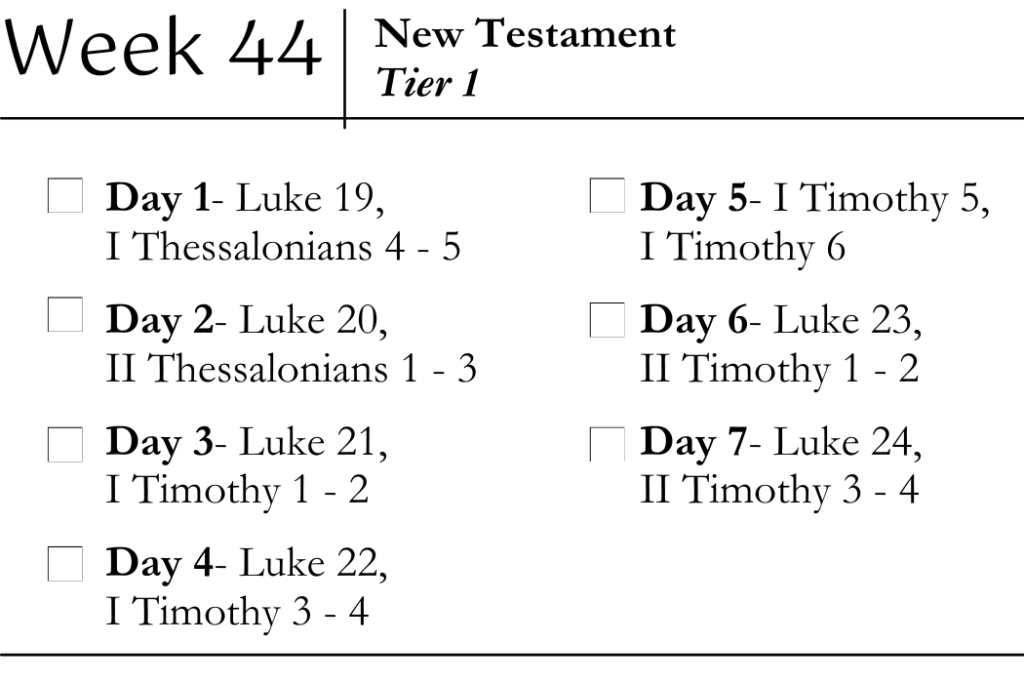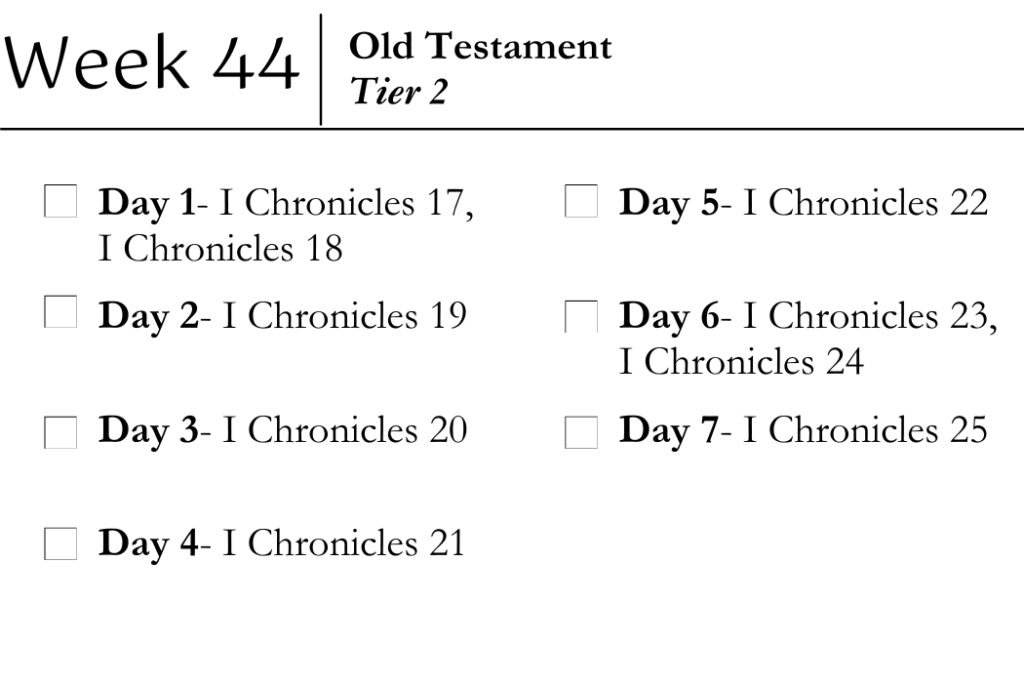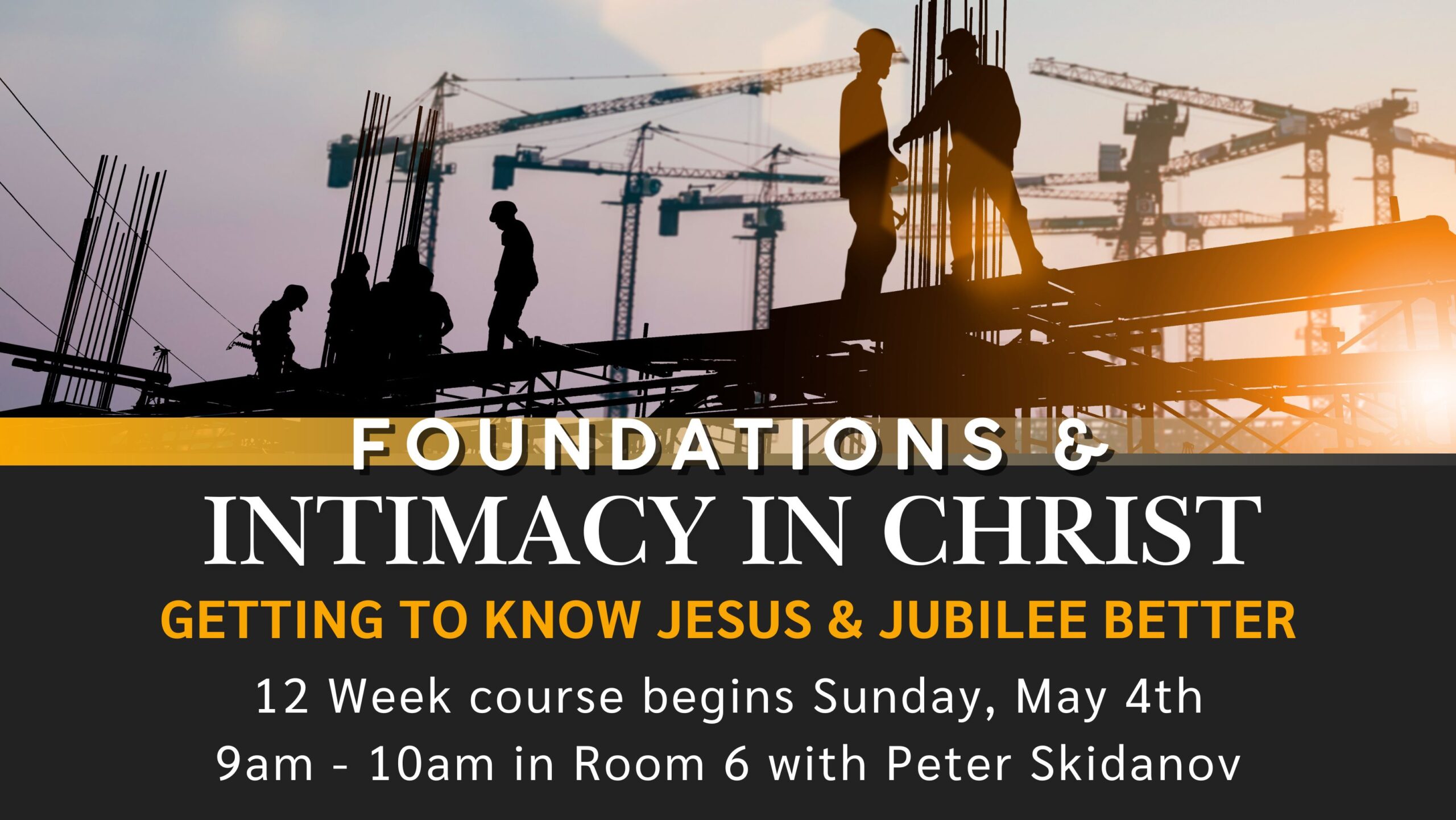God chose you for salvation by sanctification by the spirit and belief in the truth.
We are entering into rich fulfillment in Jesus’ ministry, death, and resurrection. Paul addresses order inside the church to Timothy and Titus and encourages the Thessalonians in persecution and the promise of resurrection. Love the truth!
God tells David he cannot build Him a house (because he is a man of war, who has shed blood), but that his son will. Having discovered the location of the Lord’s house and altar through his repentance and sacrifice on Mount Moriah, David now moves to prepare everything his son Solomon will need to build the house of the Lord.
WATCH That I May Know Him Week 44 PODCAST

GOSPELS
Luke 19 – 24
Jesus enters Jerusalem, but first He stays at Zacchaeus’ house in Jericho. Zacchaeus is a tax collector and sinner, but Jesus has come to seek and save that which is lost, so salvation comes to Zacchaeus’s house. Jesus enters Jerusalem in triumph but is also weeping over the blindness in the city. In Chapters 20 and 21, Jesus’ authority is questioned until the Pharisees and Sadducees have no questions left. Jesus asks them one question, “How can they say that Christ is the Son of David?” Parables, End Times, and the importance of watching in prayer are brought forth to His disciples.
In Chapter 22, Jesus keeps the Passover, institutes His new covenant, and announces His betrayer, while the disciples argue over which of them should be considered the greatest. Prayer in the garden shows again the secret to Jesus’ life of union through prayer. Jesus had a custom of prayer there and a special place He prayed in the Garden of Gethsemane (Luke 22:39, 40). In Chapter 23, Jesus is crucified, asking the Father to forgive all, making a place for the thief on the cross to be with Him in Paradise, and then after the three hours of judgment for our sin, calls out, “Father, into Your hands I commit My spirit” (Luke 23:46).
In Chapter 24, Jesus is risen and opens the understanding of His disciples to see Him in the scriptures. This is our inheritance to claim in our readings, to see all the things concerning Jesus.
EPISTLES
1 Thessalonians 4 – 5
Paul calls us to walk in sanctification and possess our own bodies in sanctification and honor. Let brotherly love increase more and more as we aspire to lead a quiet life. Next, Paul addresses what happens to a believer who dies. He declares by “the word of the Lord,” what we know as the resurrection from the dead and rapture of those still alive at the coming of the Lord. These words are to bring comfort to those who’ve lost loved ones and sobriety to us as sons of light to watch and be sober.
Paul ends with practical instructions including “Rejoice always, pray without ceasing, in everything give thanks; for this is the will of God in Christ Jesus for you” (1 Thessalonians 5:16-18).
2 Thessalonians 1 – 3
This is Paul’s follow-up letter to the Thessalonians to hold patience and faith amid persecutions until the coming of the Lord. He addresses the error of being taught that the day of Christ had already come. He assures them that the day will not come unless the falling away comes first and the man of sin is revealed. In Chapter 2, Paul contrasts the coming of the lawless one in deception with those who did not receive the love of the truth. But He gives thanks to those chosen for salvation through sanctification by the Spirit and belief in the truth. Paul again brings practical applications to these truths concerning work and an orderly life.
1 Timothy 1 – 6
Timothy and Titus are what we call the Pastoral Epistles, setting order in the church for the two young men, Timothy, and Titus, charged with this task, “The purpose of the commandments is love from a pure heart, from a good conscience, and from sincere faith” (1 Timothy 1:5). Timothy is charged to hold the faith, and not suffer shipwreck as Hymenaeus and Alexander have. The call to prayer, intercession, and giving of thanks is the priority of all men for all men.
Chapter 3 lists the qualifications for overseers and deacons. Chapter 4 shares the departing from the faith in the latter times and admonishes Timothy to not let this happen to himself. We are warned so we can apply ourselves to reading, exhortation, and doctrine, and the gifts given to us through the laying on of hands.
Chapter 5 discusses relationships in the body, the call of widows in prayer and their care, and the honor of elders. Chapter 6 brings attention to greed and its deception, noting the love of money as the root of all evil. The good confession Jesus held before Pontius Pilate is our standard to bear, as is the charge to the rich to be generous and care for their workers.
2 Timothy 1 – 4
Paul’s follow-up epistle to Timothy to not be afraid, but to know he has been saved and called according to the purpose and grace given to him in Christ Jesus before time began. Therefore, he is to disciple others: to find faithful men and commit these truths to them who will be able to teach others also. Remember that soldiers, athletes, and farmers understand work comes first then comes the reward of the labor.
Paul’s entire letter is calling Timothy to not lose heart, not argue with others, knowing that perilous times are coming, for men will be lovers of themselves. Hold your place and keep the scriptures before you, Paul charges Timothy. Paul is ready to depart for heaven. He has finished the race, kept the faith, and he has a crown awaiting him. He tells Timothy that this is for all of us who have loved His appearance.

HISTORY
1 Chronicles 17 – 25
David desires to build God a house but is told no. Instead, God will build David’s house and establish his throne forever. David continues his conquests of nations and in Chapter 19 wishes to show kindness to Hanun king of Ammon after his father’s death. But it goes terribly wrong, and David goes to war for the honor of his men. In Chapter 21, Satan stands up against Israel and moves David to number Israel (take a census). This is a sin before God that brings judgment upon Israel and 70,000 men die in a plague.
David’s sin with the census led to horrific judgment. But his repentance, ownership, and obedience in the sacrifice, bring blessings unseen, as David discovers the house of God and where the temple is to be built. The place of judgment has become the place of worship. “Then David said, ‘This is this house of the Lord God, and this is, the altar of burnt offering for Israel.’” (1 Chronicles 22:1)
David begins preparing for his son, Solomon, to build the temple. Inspired and invigorated, he recounts the Lord’s promise over Solomon and gathers the finances for the project of 100 talents of gold and 1,000,000 (1M) talents of silver—approximately $200,000,000,000 ($200B) in today’s USD. David doesn’t stop there but calls the leaders to help his son, and sets the Levites into divisions of service, as well as the priests. In Chapter 25, David also sets the prophetic worshippers in place.




